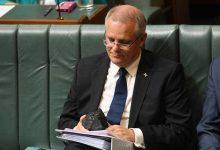Australia’s fossil fuel lobby groups have ramped-up their efforts to oppose climate action and promote fossil fuels in the wake of Covid019, strengthening their linkages to Australia’s largest resources companies as well as the Morrison government, new analysis reveals.
The new report, published by global lobbying monitor InfluenceMap has detailed just how powerful Australia’s fossil-fuel lobby groups have become, as well as the powerful relationship that the lobby groups have built with Australia’s largest fossil fuel companies.
According to InfluenceMap, resources giants BHP, Santos, Rio Tinto and Glencore ranked as the Australian companies with the strongest linkages with fossil fuel industry lobby groups which are working to undermine efforts to meet the goals of the Paris Agreement, despite facing pressure from shareholders to end their involvement in the groups.
InfluenceMap tracked over 2,000 instances of lobbying by fossil fuel lobby groups over the last five years, including attempts to water down and oppose climate change regulation, promoting fossil fuel developments, actively funding political parties through donations, actively campaigning against climate concerned politicians and taking up positions in prominent political offices, including that of prime minister Scott Morrison.
Influence Map says the intricate linkages between fossil fuel companies and the lobby groups influencing government decisions detailed in the report would help to explain the Morrison government’s stubborn push for a ‘gas led economic recovery’.
“The findings come at a critical time following an uptick of opportunistic lobbying to shape Australia’s response to the global COVID-19 pandemic. The disproportionate influence of the fossil fuel lobby identified in the report helps shed light on the Australian Government’s rejection of a “clean recovery” in favour of fossil-focused economic recovery measures,” report lead author Faye Holder said.
The report identified the five most obstructive and negative influences on climate action in Australia, representing a list of the usual suspects: Minerals Council of Australia, Australian Chamber of Commerce & Industry, NSW Minerals Council, the Business Council of Australia, and the Australian Petroleum Producers & Exploration Association.
InfluenceMap pointed to the ‘revolving door’ between these fossil fuel lobby groups and prominent political offices as an example of the depth of influence sector has on the Morrison government.
This includes several members of Scott Morrison’s own office, with the prime minster’s chief of staff, John Kunkel and senior advisor Brendan Pearson both having held senior leadership positions within the Minerals Council of Australia. Pearson is understood to have given the lump of coal brandished by Scott Morrison in federal parliament.
The lobby groups also poured money into both the Coalition and Labor parties, in the year leading up to the 2019 federal election, donating a combined $1,894,024 in the 2018-19 year, with the Coalition receiving the largest share with $1,147,376 followed by the Labor party with $725,448.
The involvement of some of Australia’s largest companies in the lobby groups has attracted the ire of shareholder advocacy groups, which have sought to apply growing pressure on Australia’s largest resources companies, particularly BHP and Rio Tinto, to cease their membership of the fossil fuel lobby groups.
BHP recently undertook a review of its membership of pro-coal groups, including the Minerals Council, but decided that it would maintain its membership as it saw more opportunities to influence the groups from the inside. According to Influence Map, the new report justifies both companies rethinking their continued involvement in the obstructionist groups.
Responding to the report, CEO of the Investor Group on Climate Change Emma Herd said that institutional investors expected that companies would act in a way consistent with the long-term aims of the Paris Agreement, as well as working to address the risks that climate change posed to the long-term performance of their businesses.
“Investors have clear expectations that companies take responsibility for the positions and activities of the industry associations acting in their name on climate policy. This was recently reiterated in the guidance of the Climate Action 100+ benchmark, which will assess whether companies are demonstrating support for Paris-aligned climate policy and ensuring their direct and indirect lobbying is consistent with this,” Herd said.
“We have seen progress in Australia on this issue from some companies and within some industry associations. But the recent experiences with COVID-19 economic recovery policy deliberations, the dominance of gas in the outcomes, and the concerns that other energy technologies were not properly considered, is a reminder there is much more work to do.”
According to InfluenceMap, while these fossil fuel lobby groups have claimed to have made climate-positive statements publicly, their efforts to oppose climate action behind closed doors remains largely the same.
“The topic is of prime concern to global investors in Australian companies, with BHP and Origin, in particular, continuing to face shareholder pressure and resolutions on their links to anti-climate lobby groups like the Minerals Council of Australia and Australian Petroleum Production & Exploration Association,” report lead author Faye Holder said.
“This report will be of particular interest to BHP vis-à-vis its most recent lobbying standards it has issued as this extensive research evidences how its associations continue to undermine the Paris targets.”
With Australia as the world’s third largest exporter of fossil fuels, behind only Saudi Arabia and Russia, Influence Map said that the report showed that not only is Australia lagging behind most of the world in terms of climate action due to a lack of political leadership, but also because of the effective and coordinated efforts of the fossil fuel lobby to prevent progress.
“The research reveals a continued campaign of ‘outside’ tactics by the fossil fuel-related lobbyists, including high profile, public spin campaigns and intimate ties between the fossil fuel sector and political establishment,” Holder added.
On the positive side, some of Australia’s clean energy industry associations ranked as some of the most positive influences on climate change policy. The Clean Energy Council ranked as the most positive influence on Australian climate and energy policy, followed closely by the Energy Efficiency Council and the Carbon Markets Institute.
The Australian Energy Council and Energy Networks Australia had a smaller, albeit still positive impact on Australian climate policy, according to the report.











